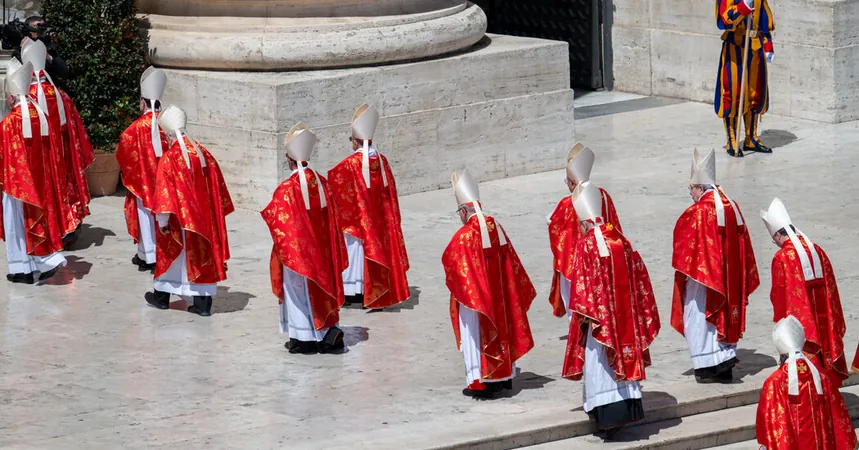
The Cardinal Chess Game: Maneuvering for Pope Francis’ Successor
2025-04-27
Author: Ken Lee
As the world mourns the passing of Pope Francis, an intense power play is unfolding among the cardinals in Rome. Before the late pontiff was even laid to rest, conservative cardinals began their strategic politicking, aiming to shape the upcoming conclave that will select his successor.
Unity or Division? The Rallying Cry of the Cardinals
At the heart of their efforts lies a deceptively simple slogan: "unity." While it sounds innocuous, this phrase resonates differently among the factions within the Church. For Francis’s staunch supporters, it carries the weight of a potential rollback of the progressive strides made under his leadership.
As the May conclave approaches, discussions are heating up about what direction the Church should take. Key issues on the table include women’s ordination as deacons, the introduction of married clergy, and communion accessibility for divorced and remarried Catholics.
Old Rivalries Resurface
Cardinal Müller, who was removed from his prominent position by Francis in 2017, emphasized the need for a unified Church amidst what he sees as current divisions. He insists that addressing these divisions is crucial and that the Church must focus on finding common ground.
However, some progressives fear that the influx of new cardinals, appointed by Francis himself, may lack the experience to challenge the conservative narrative of unity, which many view as a thinly veiled push for traditionalism. Canadian Cardinal Michael Czerny, who served closely with Francis, warned that calls for unity often mask intentions to reverse the inclusive changes championed by the late pope.
Echoes of History: A Conservative Perspective
The theme of unity is not novel to the Church. Throughout Francis’s papacy, voices like Cardinal Robert Sarah have argued that failure to strive for unity could seriously weaken the Church’s standing. Despite being a prominent critic, Sarah has consistently pushed back against what he perceives as divisive changes.
Interestingly, Francis himself framed unity as central to his vision, although his approach differed significantly. Notably, he curtailed the celebration of the Latin Mass, a tradition cherished by conservatives, citing its use as a tool for division among Catholics.
Anticipated Changes or Status Quo?
As Francis entered a later phase of his papacy, many of his progressive supporters hoped for a bold new direction. However, his actions suggested a desire for stability rather than upheaval. A 2019 meeting with South American bishops brought forth the idea of allowing older, married men to become priests to alleviate clergy shortages, a solution that Francis seemed to support but ultimately did not endorse.
Similarly, the contentious issue of women deacons sparked limited discussion under his leadership, yet he refrained from making any final decisions, stating that further study was needed. This indecision left many in the progressive camp anxious about the future.
A Balancing Act Amid Dissent
Francis did introduce major changes, such as priestly blessings for same-sex couples, a move celebrated by liberals in the West but met with considerable backlash from African church leaders. To maintain balance, Francis allowed for exemptions for these leaders, highlighting a complex navigation through cultural diversity within a united Church.
Ultimately, the question of unity within the Church is far from straightforward. As the conclave approaches, both conservative and progressive factions are gearing up for what promises to be a pivotal and contentious election.

 Brasil (PT)
Brasil (PT)
 Canada (EN)
Canada (EN)
 Chile (ES)
Chile (ES)
 Česko (CS)
Česko (CS)
 대한민국 (KO)
대한민국 (KO)
 España (ES)
España (ES)
 France (FR)
France (FR)
 Hong Kong (EN)
Hong Kong (EN)
 Italia (IT)
Italia (IT)
 日本 (JA)
日本 (JA)
 Magyarország (HU)
Magyarország (HU)
 Norge (NO)
Norge (NO)
 Polska (PL)
Polska (PL)
 Schweiz (DE)
Schweiz (DE)
 Singapore (EN)
Singapore (EN)
 Sverige (SV)
Sverige (SV)
 Suomi (FI)
Suomi (FI)
 Türkiye (TR)
Türkiye (TR)
 الإمارات العربية المتحدة (AR)
الإمارات العربية المتحدة (AR)